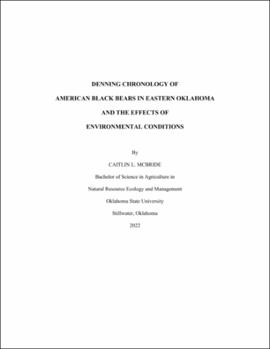| dc.contributor.author | McBride, Caitlin L. | |
| dc.date.accessioned | 2022-05-10T14:21:54Z | |
| dc.date.available | 2022-05-10T14:21:54Z | |
| dc.date.issued | 2022-05-06 | |
| dc.identifier | oksd_mcbride_HT_2022 | |
| dc.identifier.uri | https://hdl.handle.net/11244/335658 | |
| dc.description.abstract | Changing climate and rapid increase in human development strongly affect habitat use and behavior patterns in wildlife. These changes in infrastructure and animal behavior may lead to increased interaction between humans and wildlife, especially when food resources are limited. Previous studies have suggested that warmer temperatures are strongly associated with reduced duration of black bear (Ursus americanus) hibernation, which may increase bear-human conflict. However, most studies were performed in areas of high latitude and elevation. The effects of warming temperatures on hibernation could be even more dramatic near the southern parts of black bear range, but this has not been well studied. | |
| dc.description.abstract | We used GPS collar data for a population of black bears (n=37) in the Ouachita Mountains region of southeastern Oklahoma to determine the effects of environmental conditions on hibernation chronology, including denning duration, den entrance, and den emergence dates from 2014-2021. By comparing these dates to the average daily minimum temperatures, average daily maximum temperatures, and total precipitation around the denning period, we analyzed the effects of environmental conditions on hibernation chronology. Additionally, we estimated the effects of sex, age, reproductive status, and den type on denning behavior. | |
| dc.description.abstract | We found that average daily maximum temperature and precipitation were negatively associated with den emergence and the duration of denning. Additionally, we found reproductive status to strongly affect den entrance, emergence, and duration. This study will serve as baseline data to detect changes in black bears denning behavior in response to environmental conditions, which will help wildlife managers to better predict activity patterns in black bears, equipping them to help mitigate future human-bear conflicts. | |
| dc.format | application/pdf | |
| dc.language | en_US | |
| dc.rights | Copyright is held by the author who has granted the Oklahoma State University Library the non-exclusive right to share this material in its institutional repository. Contact Digital Library Services at lib-dls@okstate.edu or 405-744-9161 for the permission policy on the use, reproduction or distribution of this material. | |
| dc.title | Denning chronology of American black bears in eastern Oklahoma and the effects of environmental conditions | |
| osu.filename | oksd_mcbride_HT_2022.pdf | |
| osu.accesstype | Open Access | |
| dc.type.genre | Honors Thesis | |
| dc.type.material | Text | |
| dc.contributor.director | Fairbanks, Sue | |
| dc.contributor.facultyreader | Zhang, Bo | |
| thesis.degree.discipline | Natural Resource Ecology and Management | |
| thesis.degree.grantor | Oklahoma State University | |
